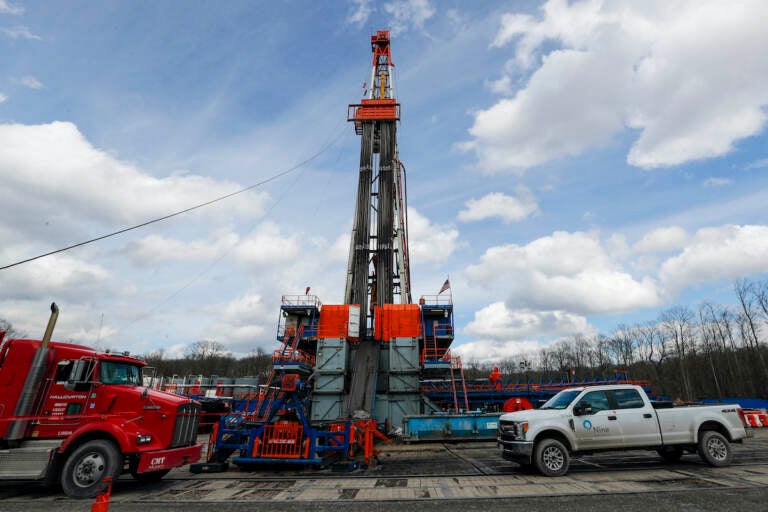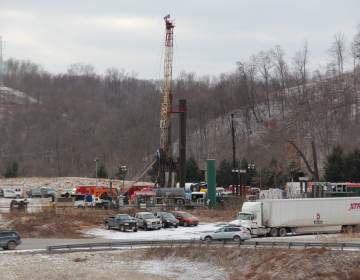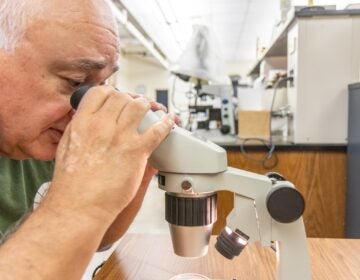A Pennsylvania fracking report had 8 recommendations. 5 years later, few have been implemented
In 2020, Josh Shapiro, then Pa.'s AG, released a landmark report with recommendations on regulating fracking. Advocates say he has done little to advance them.
Listen 1:19
File - Work continues at a shale gas well drilling site in St. Mary's, Pa., March 12, 2020. (AP Photo/Keith Srakocic, File)
This story is part of the WHYY News Climate Desk, bringing you news and solutions for our changing region.
From the Poconos to the Jersey Shore to the mouth of the Delaware Bay, what do you want to know about climate change? What would you like us to cover? Get in touch.
Five years after a landmark Pennsylvania grand jury report slammed the Department of Environmental Protection for failing to protect the public from the health effects of fracking, advocates, including those living near fracking sites, say little has changed.
The 2020 report, released by then-Attorney General Josh Shapiro, and based on testimony from residents, made eight recommendations to fix what it said went wrong during the state’s fracking boom.
“We took a risk testifying there,” said Jodi Borello, who appeared before the grand jury and lives about 1,200 feet from a well pad in Washington County. “And we feel that we were disrespected by these recommendations not being moved further.”
Borello called on Gov. Shapiro, who was elected to that office in 2022 and began his term in 2023, to do more to implement the following recommendations made by the grand jury.
- Increase the setback of all oil and gas wells from 500 to 2,500 feet from any home or business, and farther for schools and hospitals
- Make public the chemicals used in the fracking process
- Make the transportation of toxic waste safer
- Regulate smaller pipelines, or gathering pipelines, “based on risk, not size”
- Strengthen air pollution regulations of fracking-related sites
- Assess public health in relation to fracking
- Slow the “revolving door” by limiting the ability of legislators and state employees to leave public service and go to work for the industry
- Grant the Pennsylvania Office of Attorney General original criminal jurisdiction over unconventional oil and gas companies.
At a press conference Wednesday, Borello, who now works as a community organizer for the Center for Coalfield Justice, outlined the lack of progress with five of the eight recommendations, while describing action on three of the proposals as “movement in the right direction.” Borello was joined by representatives from the Sierra Club, the Environmental Health Project, Earthworks and Protect PT.
The groups said in the category of “little to no progress” are increased setbacks; slowing the “revolving door” between industry and those who have worked as state regulators or legislators; completing a comprehensive health assessment; granting criminal jurisdiction for the attorney general’s office; and increasing safety of fracking waste transportation.
“It’s been five years and nothing’s been done,” said Gillian Graber of Protect PT, referring to fracking waste. “And we know that this waste is very harmful to communities.”
Spokesman Manuel Bonder defended Shapiro’s record as both attorney general and governor in an emailed statement. Gov. Shapiro “took on powerful interest groups to protect Pennsylvanians’ constitutional right to clean air and pure water, including leading the 43rd Grand Jury report, which held industry accountable for failing to protect Pennsylvanians’ health and safety.”
Bonder pointed the finger at the legislature, and said Shapiro continues to call on lawmakers to move on the recommendations. “While the legislature has failed to act, Governor Shapiro has continued the fight to make progress on these critical issues, including requiring natural gas operators to disclose chemicals used in drilling, implementing controls on methane emissions, and collaborating with a leading natural gas operator to conduct the most intensive study of unconventional gas wells in the nation. The Shapiro Administration will continue to focus on addressing climate change, reducing emissions, and safeguarding public health while creating jobs and protecting consumers.”
But meaningful reform could be a challenge in a divided Harrisburg, where Republicans hold the majority in the Senate.
‘No way for any human being on this earth to live’
In November 2023, Gov. Shapiro announced a deal with the Canonsburg-based driller CNX Resources, which he said resulted from the grand jury report and described it as a model of how to drill without causing environmental and health impacts. But the arrangement, which is voluntary and limited to one company, was panned by environmentalists and health researchers. The setbacks required in the deal expanded from 500 to 600 feet for residences, instead of the grand jury’s recommendation of 2,500 feet.
Proximity of residential areas, schools and hospitals to active oil and gas wells continues to be a point of frustration for those who had high hopes the grand jury’s report would spur reforms. A number of environmental groups petitioned the state’s Environmental Quality Board in October 2024 to increase setbacks. While the Department of Environmental Protection signed off on the proposal, in April, the 20-member board — the majority of whom serve in Shapiro’s administration — tabled the vote, to the frustration of advocates who say health impacts continue.
The well site that lies 1,200 feet from Borello’s home in Washington County is owned and operated by CNX Resources.
“A gas well that caused nosebleeds to my family,” Borello said. “The particulate matter was off the charts. We would go outside, we would be dizzy, we’d have stomach aches, we would have chest pains.”
Borello said the company, CNX Resources, built additional pipeline infrastructure at the well site in 2012 that continued to emit air pollutants.
“And sometimes they would blow off for hours and hours,” Borello said. “My family had chemical burns to our eyes and our skin. It was a horrific experience.”
Borello said the company would do it three times a day, seven days a week, which led to criminal charges against CNX.
“And my children grew up living in a world where they had 60 seconds to run indoors before those emissions, that you could visually see, were blowing into our yard. That is no way for any human being on this earth to live.”
Bonder said in an email that DEP has expanded its team of fracking and toxicology experts and is reviewing best practices to minimize health impacts, including using electric-powered equipment. He said the administration has also improved its complaint registry.
With regard to the health assessment, one of the most recent and comprehensive health studies was conducted by the University of Pittsburgh at the behest of the Pennsylvania Department of Public Health. Released in August 2023, it found that children living near gas wells in heavily drilled parts of the state were more likely to develop a relatively rare form of lymphoma, and that nearby residents of all ages had an increased chance of incidents of severe asthma. It did not find an association to other types of childhood cancers.
Still, the advocates say the state is “ignoring” the study and its results.
What else is being done to implement fracking reforms?
Several stalled legislative proposals would allow the attorney general’s office to pursue criminal charges without referrals from local lawmakers. Another bill would force DEP to consider the cumulative impact of multiple oil and gas sites on air pollution in environmental justice areas.
Bonder wrote in the email that the administration is “implementing a new criminal referral protocol and enforcement strategy.”
The environmental groups said progress has been made on disclosure of fracking chemicals, but say proprietary chemicals should not be exempt.
In February 2024, one company, Chemstream, agreed to disclose all of its chemicals, including those considered trade secrets.
Meanwhile, Borello said she still files complaints to the DEP about the CNX well site.
“The most recent one was this past December,” Borello said in an email. “The DEP told me verbally that they are allowed to blow emissions into my yard. They are exempt at this site. It is very disheartening.”

Get daily updates from WHYY News!
WHYY is your source for fact-based, in-depth journalism and information. As a nonprofit organization, we rely on financial support from readers like you. Please give today.






